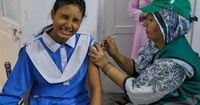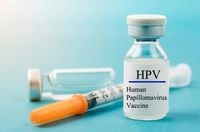Pakistan has taken a bold step in the fight against cervical cancer, launching a sweeping national campaign that has already vaccinated about 9 million adolescent girls against the human papillomavirus (HPV). This ambitious drive, which began on September 15, 2025, aims to immunize 13 million girls aged 9 to 14, targeting one of the leading causes of cancer among women in the country. Despite a rocky start marked by widespread skepticism and misinformation circulating on social media, the campaign has managed to turn the tide, thanks in part to high-profile endorsements and a groundswell of public health advocacy.
HPV is the primary culprit behind most cases of cervical cancer, which is the third most common cancer among Pakistani women, trailing only breast and ovarian cancers. According to health authorities, the disease claims between 18,000 and 20,000 lives every year in Pakistan. Globally, cervical cancer ranks as the fourth most common cancer among women, underscoring the urgency of prevention efforts.
From the outset, Pakistan’s campaign faced a barrage of online rumors. Some parents, influenced by false claims on social media, feared that the HPV vaccine could cause infertility or was part of a foreign plot to reduce the Muslim population. As Ali Sheikh, a mother of two from Karachi, told The Associated Press, “I have heard that the vaccination is being used to make women infertile and reduce the population of Muslims. Social media is full of such claims, and I was advised by relatives not to allow health workers to vaccinate my daughters.”
These rumors led to high refusal rates in the campaign’s early days, with more parents saying no than yes. Health workers on the ground bore the brunt of this skepticism. Shamim Anwar, a 52-year-old health worker in Karachi, described the challenge: “It is very difficult work. Many parents refuse because of rumors and hesitate to let us vaccinate their daughters. Sometimes we even face humiliation, but we tolerate it because we have to complete the vaccination target.”
Faced with these obstacles, national and local leaders stepped up in a very public way. Pakistan’s Health Minister Mustafa Kamal made headlines when he administered the vaccine to his own daughter live on stage at an event in Karachi. “By the grace of God, administering the vaccine to my daughter publicly had a huge impact,” Kamal told The Associated Press. “From the fifth day of the campaign, refusal rates began dropping and acceptance climbed to 70–80% in some districts.”
Mayor Barrister Murtaza Wahab of Karachi also joined the effort, vaccinating his daughter against HPV and sharing photos of the event to encourage other families to participate. At a vaccination center, Mayor Wahab emphasized the importance of trusting medical experts over rumors. “The HPV vaccine is a proven preventive measure against cervical cancer and other related diseases,” he said, urging parents to get their daughters vaccinated without fear or hesitation. His public gesture led to a noticeable uptick in public interest, with health workers in Karachi reporting more queries about HPV vaccination after the event.
The Sindh government has thrown its weight behind the campaign, offering free HPV vaccinations in Karachi and other districts for girls aged 9 to 14. The drive is not limited to clinics: vaccination centers have been set up in schools and hospitals, and teams have been deployed nationwide to reach as many girls as possible. The campaign’s slogan, “one jab will do the job,” has been promoted by experts to underscore the vaccine’s effectiveness and simplicity.
Despite the initial reluctance, the campaign’s results so far are remarkable. With about 9 million girls vaccinated as of September 26, 2025, Pakistan has achieved 70% of its goal in just under two weeks. The vaccine, which is offered free of charge, typically causes only minor side effects, according to officials. The initial focus has been on girls in Punjab and Sindh provinces and in Pakistan-held Kashmir, but the government plans to expand coverage to additional areas by 2027. The ultimate aim is to eliminate cervical cancer as a public health problem by 2030.
Pakistan’s commitment to this cause is noteworthy on the global stage. By incorporating the HPV vaccine into its national immunization schedule, the country became the 149th in the world to do so. Health officials hope that this milestone will pave the way for other countries facing similar challenges to follow suit.
Public health campaigns in Pakistan have never been easy. Misinformation, cultural taboos, and logistical hurdles have often hampered efforts to vaccinate against diseases like polio and measles. Yet, the cervical cancer vaccination campaign has demonstrated that change is possible, especially when leaders lead by example and communities are engaged directly.
Awareness drives have been crucial in shifting public opinion. Health officials in Karachi and beyond have ramped up their outreach, opening more vaccination centers and holding educational sessions to dispel myths and answer questions. The Sindh Health Department, for instance, has increased its presence in schools and hospitals, making it easier for families to access the vaccine at no cost.
For health workers like Shamim Anwar, the work remains demanding but rewarding. The sense of purpose—protecting girls from a deadly but preventable disease—keeps them going, even when faced with skepticism or outright hostility. The hope is that as more families see the benefits firsthand, acceptance will continue to rise and resistance will fade away.
Looking ahead, the government’s plan to expand the campaign by 2027 is ambitious but achievable, given the momentum already built. If successful, Pakistan could become a model for other nations grappling with similar public health challenges. The goal of eliminating cervical cancer as a public health threat by 2030 now seems within reach, provided that the campaign’s early successes are sustained and that the fight against misinformation continues.
In a country where public health initiatives often face daunting odds, the HPV vaccination campaign stands out as a story of perseverance, leadership, and hope. It’s a testament to what can happen when science, community engagement, and political will come together for the greater good.






